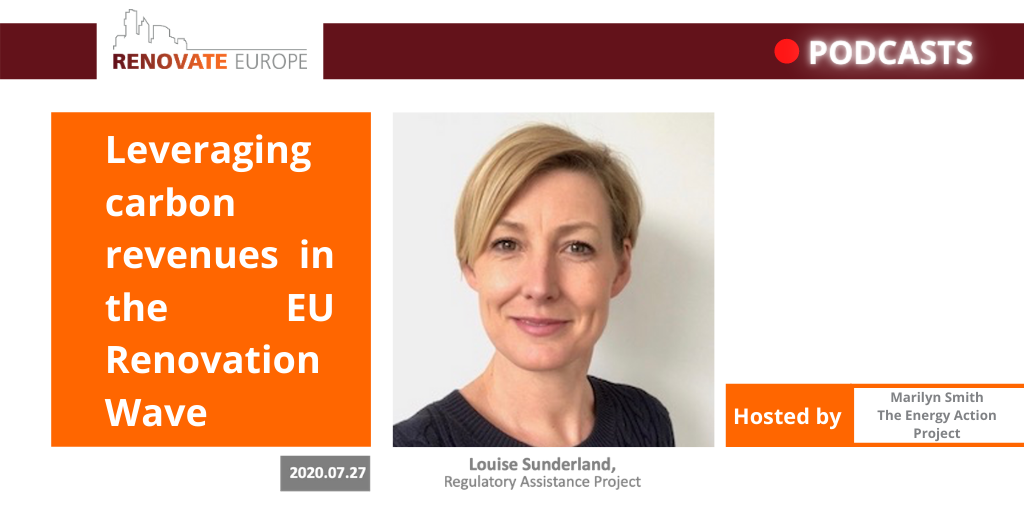Policy Dispatch - Campaign Director Adrian Joyce
Our Campaign Director Adrian Joyce sits down with Sam Morgan from FORESIGHT for an insightful conversation in the latest Policy Dispatch podcast episode.
During the talk, which took place in Šamorín (Slovakia) in the auspices of the last C4E Forum, Adrian and Sam dig deep into multiple debates that are currently surrounding the buildings policy discussion.
First of all, they touch upon which are the main barriers that energy efficiency and renovation policies have to face. Agreeing with the two elements brought forward by the C4E audience during the opening plenary, Adrian Joyce highlights “political will” and “finance” as the two main challenges. Increased pressure by the civil society and business sector is presented as essential to combat the first of these challenges, while the need to encourage more private financing is defined as the way to tackle the second.
Following the conversation, also some concern is voiced regarding the gradual closing of the window of opportunity to act on buildings and its subsequent urgency to act now. A strong Fit for 55 Package, ended with an ambitious Energy Performance of Buildings Directive (EPBD), is deemed fundamental to mobilise the multiple stakeholders during the implementation phase.
Unfortunately, Mr. Joyce also shows some slight concern on this actually happening considering the high-levels of politicisation and electioneering that a file such as the EPBD is currently suffering.
When asked about the success of the European Union’s answer to the COVID-19 crisis and the invasion of Ukraine with initiatives such as the Recovery and Resilience Facility and the REPowerEU. Our Campaign Director pinpoints the former, with its National Recovery and Resilience Plans, as the most promising tool for energy renovation. Nonetheless, he also puts emphasis on the fact that such plans have retarded the plans for the implementation of the Multi-annual Financial Framework 2021-2027.
He also makes mention that although it is true that there has never been as much money available for energy renovation as there is now, the need of innovative financial instruments from the side of the private sector (via tools like the Mortgage Portfolio Standards) will be key to untapped the great amount of equity in buildings in order to make the Renovation Wave possible.
When faced with the question of “is it maybe true that subsidy schemes cannot be fully replicated between different Member States because of their different climatic conditions?” Mr. Joyce prefers to put emphasis on the fact that actually many common criteria can be applied to all of them that will make them successful programmes, such as: not basing them on the annual budget cycles, not designing them for single measures, and ensure a measurable improvement in energy performance backed up by real performance data.
The episode comes to a close by a quick fact-checking on several points. The first is the believe that there is not enough money for renovation and that it should not be a big priority, to which Adrian makes reference to the previously discussed numbers when it comes to the money available and elevates the need to improve our buildings for many reasons (energy consumption, climate and well-being). Next, for the concern that people will have to sell their homes because of not being able to afford renovations, Mr. Joyce highlights the fact that it is already planned that all programmes will be tailored to the different situations of each citizens and that they are structured in accordance to the property market dynamics therefore making this assumption incorrect. And finally, against the thought that heritage buildings will have to be torn down, he discusses the multiple exemptions that are already contemplated for such buildings as well as the possibility to improve the energy performance of many of them while keeping their cultural and historic value.
Listen to the full episode here.
Energ’Ethic podcast – Vice-Chair Julie Kjestrup (VELUX)
Our Vice-Chair Julie Kjestrup (Head of Policy and Thought Leadership for VELUX) is the last invitee of the Energ’Ethic podcast hosted by Marine Cornelis.
Listen to the full conversation here.
Leveraging carbon revenues in the EU Renovation Wave
Background
The European Green Deal calls for a just, clean energy transition and makes a commitment to ‘leave no one behind.’ The state of EU buildings creates a dual challenge for decarbonising the 27 EU economies. First, buildings account for 40% of EU energy demand and 36% of greenhouse gas emissions, with those average figures varying widely from country to country. Second, inefficient homes are the main reason some 50-100 million EU citizens currently live in situations of energy poverty.
Considering that 97% of EU buildings need some level of energy renovation, some estimates put the cost at €300 billion per year for the next 30 years – €1 billion per day, every day until 2050. But counting just the costs misses the more important point: according to the International Energy Agency, aggressively implementing energy efficiency on a global scale could deliver benefits of €500 billion annually.
The Renovate Europe Campaign is pleased to see the call for a Renovation Wave within the EU Green Deal – and is actively engaged in shaping its strategy. Knowing that such an effort must be undertaken strategically, we’ve launched this podcast series to give voice to a range of experts to explore topics such as who needs to take action — when, where, why and how — in order to optimise efficiency gains and returns on investment. As sustaining a renovation wave will require effective policy and large-scale practical action, we will investigate examples of early movers who can show promising results.
For this podcast series, the Renovate Europe Campaign is collaborating with The Energy Action Project (EnAct), acknowledging their important reporting on energy poverty the EU through the COLD@HOME website.
Podcast 1: Leveraging carbon revenues in the EU Renovation Wave

The Renovate Europe Campaign invites Louise Sunderland of the Regulatory Assistance Project (RAP) to talk about her recent research, which shows that using carbon revenues to fix the homes of low-income families delivers better returns than existing stop-gap measure to reduce the impacts of energy poverty. Louise also brings the perspective of volunteering at a community energy cooperative in South London that provides services to low-income households. With host Marilyn Smith of The Energy Action Project (EnAct), this podcast digs into the reality that people spend 90% of their time indoors and homes make up 75% of the EU building stock. The renovate challenge is exacerbated by huge variety in housing types and the need for large-scale investment, delivered in relatively small sums.
Speaker: Louise Sunderland, The Regulatory Assistance Project (RAP)
Host: Marylin Smith, the Energy Action Project (EnAct)
Listen here: https://soundcloud.com/user-443004419/leveraging-carbon-revenues-in-the-eu-energy-renovation-wave/s-1nYVltEHqtL



